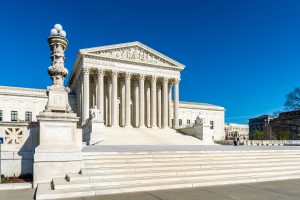The Supreme Court heard arguments on Tuesday in a case questioning the taxation of a couple who did not profit from their investment, potentially challenging numerous provisions in the tax code and jeopardizing Democrats’ attempts to enforce a wealth tax on the wealthiest Americans, depending on the court’s ruling.

In the case of Moore v. United States, Charles and Kathleen Moore invested $40,000 in the Indian company KisanKraft Machine Tools Private Limited. They reinvested the proceeds from the investment back into the business without taking any profit. However, they were taxed $14,729 on this investment under the “mandatory repatriation tax” (MRT), a provision in the GOP’s 2017 tax law. The MRT imposed a one-time tax on U.S. individuals and companies with a substantial stake in foreign corporations controlled by Americans.
The Moores filed a lawsuit against the government, contending that they should not be taxed on their “unrealized” gains, as income from investments or assets is typically taxed after those assets have been sold at a profit when the gains are considered “realized.”
While the focus of the case is on the MRT, tax experts caution that its implications could extend to various sections of the tax code and the overall economy, affecting foreign earnings and influencing the concept of taxing unrealized gains, particularly for businesses.
The case has potential repercussions for business owners in partnerships who could be taxed on their company’s profits without selling their stake. It may also impact taxes on foreign earnings related to intellectual property like trademarks and copyrights. Additionally, Democratic-led states argue that it could destabilize state taxes, as over a dozen states have tax provisions aligned with affected federal laws.
Experts warn that accepting the notion that only realized income is taxable could endanger long-standing provisions of the current federal income tax and result in substantial revenue losses, according to a report by the Tax Policy Center at the Urban Institute and Brookings Institution. Economists caution in a court filing that the impact on the economy could be profound.
A ruling favoring the Moores could disrupt Democratic proposals for taxing the wealthiest Americans, including a “wealth tax” based on an individual’s net worth or an income tax on wealthy individuals’ unrealized capital gains proposed by the Biden administration. The Moores, acknowledging these tax proposals, argue that a ruling in their favor could prevent a significant constitutional clash over the legality of such taxes. Senator Ron Wyden expressed concern that a ruling for the petitioners could establish a precedent allowing billionaires to avoid paying a fair share in taxes.




